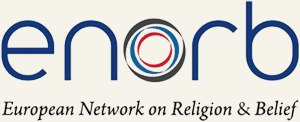By Catriona Robertson
BRINGING EVERYONE TO THE TABLE
When four people were shot at the Jewish Museum in Brussels on May 24 this year, the shockwaves didn’t only spread geographically, they reverberated back in time. Europe’s history of religious tolerance, stretching back longer than many imagine, is far from unblemished. Members of the European Network on Religion and Belief (ENORB) responded immediately; a statement by Muslims condemning the killings was quickly followed by another from a Jewish organisation.

ENORB is a European network for mutual understanding and common action between religious, humanist, and inter-convictional (a word which works better in French than in English!) organisations and practitioners across a very diverse continent. The Network sprang from a desire to link grassroots groups who are building ‘communities of peace’ in their own neighbourhoods; to combat discrimination and hate crime on the basis of religion or belief; and to fill a gap – there was no network covering the Religion and Belief strand of European Union (EU) Fundamental Rights and Equalities policies.
References to R&B in this context regrettably do not include the music of Alicia Keys. Under human rights and anti-discrimination legislation, Europeans have the right to hold their own religious beliefs or other philosophical beliefs, similar to a religion. We also have the right to have no religion or belief. Registered two years ago, ENORB works closely with established equality-networks for other strands, such as the European Network Against Racism and the International Lesbian and Gay Association.
The EU is obliged under the Treaty of Lisbon to respect churches and religious associations, including philosophical and non-confessional organisations, and to “maintain an open, transparent and regular dialogue with these churches and organisations.” The three presidents of the EU meet leaders of both groups once each year, but at different times. Bringing the two groups together is thought to be a step too far at present.
The EU needs competence in religion and belief, not just in its internal policy making, but in its External Action Service (foreign policy). It is hard to grasp exactly what is going on in the post-Arab Spring nations or in the contested area of religious dress (frequently affecting Muslim women, but also many others, such as Sikh schoolboys) without a lively understanding of how religious and secular thinking and identity plays out in the twenty-first century.
The growth of the popular right and of the far right in European politics, continued anti-Muslim and anti-Semitic hatred, patterns of discrimination and privilege, and a lack of consensus on both religious freedom and on the benefits of secular society is felt not only on the streets of European cities but also by the institutions of the EU. By adding the expertise of local communities to the insight of academics and policy makers, ENORB enables an exchange of knowledge and provides a safe place for conversations rooted in lived experience. Vice-President of the European Parliament László Surján and Dennis de Jong MEP have taken part in our seminars, along with senior staff members from the institutions of the EU.
Leaders at a recent ENORB gathering.
The life of the network is not confined to recognising injustice in one area alone. An awareness of intersectionality is reflected in our activities. When ENORB gathers in Brussels, there are not only people from different religious and belief traditions: we speak different languages, we belong to different ethnic groups, we embody a range of colonial heritage, some of us are from the sunny Mediterranean and some from Scandinavia, we are women and men from different generations. With a variety of cultural norms, the straight-talking Dutch struggle, I’m told, with the overly polite British – “Say what you mean!” Our practice of rotating roles is revealing; an Italian-led meeting is not the same as one led by a Belgian. Over time, and through friendship and goodwill, a rich exchange develops.
Within this complexity, broad themes are evident: former Soviet Bloc countries are rediscovering religious freedom, whereas the anti-clerical history of France continues in a deep commitment to laïcité and in freedom from religion, particularly in publicly funded places.
ENORB brings all this together. We know we won’t agree on everything; indeed it’s our differences that strengthen our combined efforts. But we are committed to listening to each other, to learning from our wide range of experiences, to ‘disagreeing well’ and supporting each other in the face of unfairness, discrimination and hate crime, and in liaising with the EU. ENORB is not an arena for trying to win – we try to share.
One of ENORB’s founding beliefs is that the solutions to rising hate crime and discrimination are to be found not just in the professional skills of policy makers but in the lived experience of communities.
Fledgling ENORB groups are developing in the UK, France, Netherlands, Sweden, and Belgium. Visits and exchanges are encouraged from within Europe and from further afield.
ENORB has convened five seminars in Brussels, two of them at the European Parliament: Security in Europe – May 2012; Europe’s Economic Crisis – November 2012; Fair Treatment for All – March 2013; Joint Seminar with the International Lesbian & Gay Association – September 2013; and “Is wearing articles of faith a threat to European democracies?” – December 2013.
Registered under Belgian law, ENORB’s activities are currently organised by an energetic executive committee. Reports and papers can be found on the website. The Open Society Foundations have supported our seminars, and in due course we hope to take our place alongside the other Fundamental Rights networks, playing an essential role in modelling and promoting a just and peaceful Europe, and fulfilling the vision of the founders of the EU, where events such as those in Brussels on May 24 are unthinkable.


